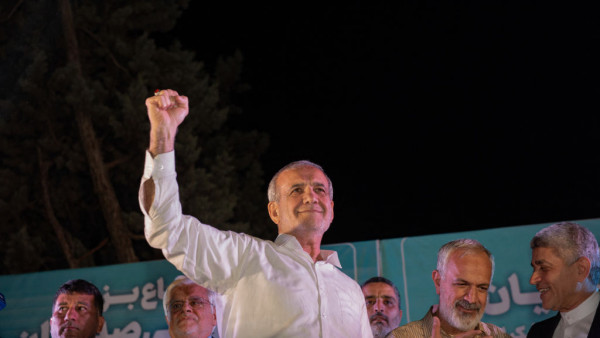Newly elected president Masoud Pezeshkian successes the late President Ebrahim Raisi who died in a helicopter crash in May [GETTY]
Reformist candidate Masoud Pezeshkian won Iran’s runoff presidential election on Saturday.
He bested hard-liner Saeed Jalili by promising to reach out to the West and ease enforcement of the country’s mandatory hijab law after years of sanctions and protests squeezing the Islamic Republic.
A vote count offered by authorities put Pezeshkian as the winner with 16.3 million votes to Jalili’s 13.5 million in Friday’s election.
Pezeshkian promised no radical changes to Iran’s Shiite theocracy in his campaign and long has held Supreme Leader Ayatollah Ali Khamenei as the final arbiter of all matters of state in the country.
But even Pezeshkian’s modest aims will be challenged by an Iranian government still largely held by hard-liners, Israel’s ongoing war on Gaza, and Western fears over Tehran enriching uranium to near-weapons-grade levels.
The first round of voting on 28 June saw the lowest turnout in the history of the Islamic Republic since the 1979 Islamic Revolution. Iranian officials have long pointed to turnout as a sign of support for the country’s Shiite theocracy, which has been under strain after years of sanctions crushing Iran’s economy, mass demonstrations and intense crackdowns on all dissent.
Government officials, including Supreme Leader Ayatollah Ali Khamenei, predicted a higher participation rate as voting began. State television aired images of modest lines at some polling centres nationwide.
However, online videos purported to show some polls empty, while a survey of several dozen sites in the capital, Tehran, saw light traffic amid a heavy security presence on the streets.
The vote comes amid heightened regional tensions. In April, Iran launched its first-ever direct attack on Israel over the war in Gaza, while militia groups that Tehran arms in the region – such as the Lebanese Hezbollah and Yemen’s Houthi rebels — are engaged in the fighting and have escalated their attacks.
Iran is also enriching uranium at near weapons-grade levels and maintains a stockpile large enough to build several nuclear weapons, should it choose to do so. And while Khamenei remains the final decision-maker on matters of state, whichever man wins the presidency could bend the country’s foreign policy toward either confrontation or collaboration with the West.
The campaign also repeatedly touched on what would happen if former President Donald Trump, who unilaterally withdrew America from the Iran nuclear deal in 2018, won the November election. Iran has held indirect talks with President Joe Biden’s administration, though there’s been no clear movement back toward constraining Tehran’s nuclear program for the lifting of economic sanctions.
More than 61 million Iranians over 18 were eligible to vote, with about 18 million between 18 and 30. Voting was to end at 6pm but was extended until midnight to boost participation.
The late President Ebrahim Raisi, who died in a helicopter crash in May, was seen as a protégé of Khamenei and a potential successor as supreme leader.


